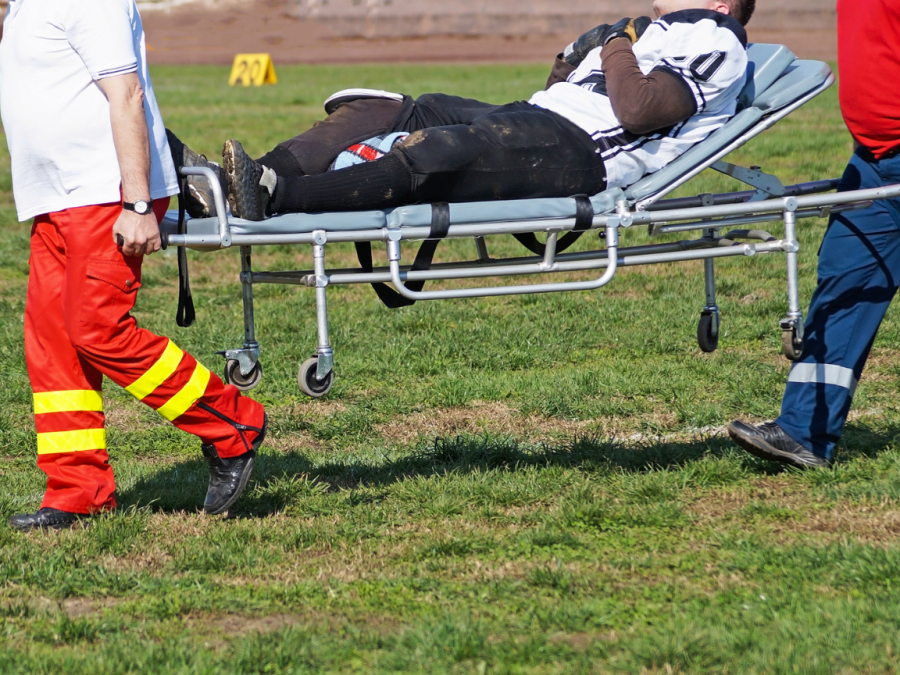NFL needs to put player safety over profit
Bills Safety Damar Hamlin suffered a cardiac arrest on Jan. 2 during the “Monday Night Football” matchup between the Buffalo Bills and Cincinnati Bengals. Does the NFL need to do a better job of protecting their players?
The NFL has failed to protect its players and the past season has shown that they aren’t willing to change.
Horror struck TV screens across the nation on Jan. 2 when 24-year-old Buffalo Bills safety Damar Hamlin suffered a cardiac arrest after what appeared to be a routine tackle.
The game was immediately put on halt while an ambulance arrived on the field after paramedics resuscitated Hamlin and he was transported to the University of Cincinnati Medical Center about 16 minutes later.
“They’ve been given five minutes to quote-unquote get ready to go back to playing,” said ESPN Sports Broadcaster Joe Buck on air.
Disgusting. Inhumane. Deplorable. All are words that come to mind, but to make matters worse, the NFL denied telling Buck to say the teams had five minutes to warm up and resume the game.
The NFL’s Executive Vice President of Football Operations Troy Vincent said their thoughts were with Hamlin and that there was never an option to continue the game.
Vincent is correct that continuing the game should never have been an option, but if that is the case then why didn’t the NFL cancel the game as soon as Hamlin needed to be resuscitated?
While it’s true that the NFL is a business, if the NFL cared about the safety of its players, there is no reason the game should have continued.
Fans just watched someone who could have possibly taken their last breath before their eyes. Players saw their brother collapse. It shouldn’t be a debate about whether the game should continue.
Whether you are a fan of Buck or not, team officials and national pundits appear to be on his side. One anonymous team official told ESPN that the teams would’ve refused to play even if the NFL threatened them to, according to an article published by ESPN.
To back it up, players and coaches from both the Bills and Bengals confirmed in press conferences that they were told to go back and play after seeing Hamlin get resuscitated.
During the broadcast, some players can even be seen practicing and warming up before returning to the locker room.
The NFL Players Association President JC Tretter also said the NFL mishandled the Hamlin situation.
“I think sometimes when you spend a lot of time asking for everybody’s answer, you’re looking for a specific answer,” Tretter said, in an article published by ESPN. “It’s why it probably took an hour, in my opinion.”
While Hamlin is now home and on the road to recovery, this is not the first time the NFL was caught caring more about their product than their players.
Miami Dolphins quarterback Tua Tagovailoa went into concussion protocol during a week three matchup against the Buffalo Bills. He would pass concussion protocol and the team would then say it was a back injury instead.
Suspicions naturally arose, especially when Tagovailoa was seen getting up and stumbling immediately afterward.
However, Tagovailoa was cleared to play the next game, just four days later against the Cincinnati Bengals. After being sacked and slammed to the ground in the second quarter, he went into a fencing position.
Tagovailoa was then taken off the field on a gurney and transported to a Cincinnati hospital.
What went wrong?
Was it the concussion protocol? The medical staff misdiagnosed him? Did the Dolphins staff rush him back?
It looked like the NFL did everything possible. They had the concussion protocol in place, he was diagnosed and passed therefore the Dolphins were allowed to have him play.
However, the real question is did the NFL do enough to protect Tagovailoa?
No. The NFL denied and deflected any wrongdoing even though their actions following the event proved otherwise.
The NFL said it was a freak accident, but then the NFLPA later dismissed the doctor who cleared Tagovailoa to play after “making several mistakes” in his diagnosis, according to People magazine.
Risking Tagovailoa’s life for entertainment is unacceptable and should raise red flags for everyone.
The NFL needs to ensure that the product they put on the field is as safe as possible.
Let’s hope the NFL learns from this season and focuses on protecting players in the future, rather than hiding their mistakes.

